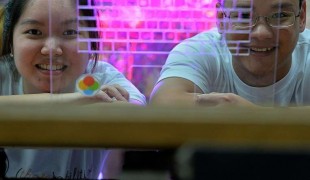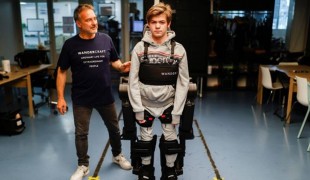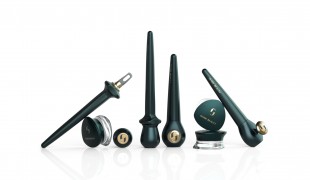- 5923
- 384
- 5
- 5
- 0
- Help Ukraine
Über die Lösung
Ceri Longville, aus Großbritannien, leidet an Zerebralparese, mit einer wackeligen rechten Hand.
Sie teilte ein paar Tipps auf ihrem Blog, wie man die Maussteuerung zu verbessern, für Menschen mit Behinderungen:
1. Ich reduzieren die Empfindlichkeit der Maus auf "sehr niedrig", dies kann in der Systemsteuerung durchgeführt werden. Fuller Anweisungen kann leicht online gefunden werden. Ich brauche eine größere Fläche für die Maus - die Maus-Pad ist zu klein, aber ein Gaming-Pad wird es tun.
2. Bei der Grafiken zu arbeiten, wenn ich brauche, um eine wirklich kleine Veränderung zu machen, wie glatt eine raue Kante. Ich vergrößern Sie das ist, dass Arbeit muss so die Pixel groß auf dem Bildschirm angezeigt. Dies macht es ein wenig leichter.
3. Meine steadiest Teil meiner Hand ist ganz rechts zwei Finger meiner Hand und die Handfläche unten, damit ich halten Sie die Maus auf eine andere Weise zu den meisten Volks - Klicken mit meinen kleinen Finger.
4. Suchen Sie das abgerundete Maus, die meine Hand kann herum wickeln viel einfacher, als eine flache eins.
Http://www.disabilityhacker.com/page/4/: Adaptiert
Diese Lösung enthält keinen Hinweis weder auf die Verwendung von Arzneimitteln, Chemikalien oder biologische Stoffe (einschließlich Lebensmitteln) noch auf invasive Geräte, anstößige, kommerzielle oder inhärent gefährliche Inhalte. Diese Lösung wurde nicht medizinisch validiert. Vorsicht! Wenn Sie irgendwelche Zweifel haben, wenden Sie sich bitte an einen Arzt.
DISCLAIMER: This story was written by someone who is not the author of the solution, therefore please be advised that, although it was written with the utmost respect for the innovation and the innovator, there can be some incorrect statements. If you find any errors please contact the patient Innovation team via info@patient-innovation.com
-
-
675
-
0
-
12484

Lowcost-Tastensperre für Menschen mit Behinderungen
Video gaming
Writing (letters, songs, peoms)
Parkinson's Disease
Stroke
Muscular Dystrophy
Assistive Technology access
Strategy/Tip
Assistive Daily Life Device (to help ADL)
Chest pain or discomfort
Gait abnormalities (e.g., walking difficulties, unsteady gait)
Tremors
Muscle cramps or spasms
Difficulty coordinating movements
Stiffness or rigidity (difficulty moving)
Muscle weakness
Fatigue
Dizziness or lightheadedness
Numbness or weakness in the legs
Fainting or loss of consciousness
Irregular heartbeat (arrhythmia)
Cold hands or feet
Rapid heartbeat (tachycardia)
Transpiration (Sweating)
Shortness of breath
Chest tightness/pressure
Restoring mobility
Promoting self-management
Promoting inclusivity and social integration
General and Family Medicine
Neurology
Singapore
-
-
-
421
-
0
-
5888

Vater stellt Exoskelett her, um Sohn mit genetischen neurologischen Erkrankungen beim Gehen zu helfen
BODY BALANCE: Maintaining body balance
STANDING UP: Standing up from a seated position
WALKING WITH A WALKING AID: Walking with a walking aid
CAREGIVING
Cervical spinal cord injury/Tetraplegia
Assistive Technology access
Walking Aid (wheelchair/walker/crutches)
Restoring mobility
Managing pain
Promoting self-management
Preserving Organ Function
Managing Neurological Disorders
Recovering from Traumatic Injuries
Maintaining Balance and Mobility
Restoring Blood Circulation
To improve Treatment/Therapy
Preventing (Vaccination, Protection, Falls, Research/Mapping)
Raise awareness
Caregiving Support
General and Family Medicine
Intensive Care Medicine
Neurology
Physical Medicine and Rehabilitation
Sports Medicine
France
-
-
-
361
-
0
-
3989

GUIDE Beauty, entwickelt von einem Parkinson-Patienten, revolutioniert zugängliches Make-up
Grip
CAREGIVING
Parkinson's Disease
Assistive Technology access
Assistive Daily Life Device (to help ADL)
Tremors
Trouble with fine motor skills (e.g., writing, buttoning clothes)
Restoring mobility
Promoting self-management
Managing Neurological Disorders
Preventing (Vaccination, Protection, Falls, Research/Mapping)
Raise awareness
General and Family Medicine
Internal Medicine
Neurology
Physical Medicine and Rehabilitation
United States
-
 de
de